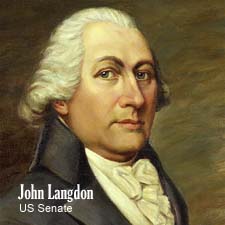Page 1 of 3

FRAMERS OF FREEDOM
A historian once said that the history of New Hampshire from the beginning of the Revolutionary War until the beginning of the nineteenth century was little more than the history of John Langdon. While that is an overstatement, few other men were as influential in both state and national politics as was Langdon. As a member of the Continental Congress, he has also earned his place in history of the nation.
On December 14, 1774, John Langdon became one of the first prominent Americans to risk hanging when he led the raid on Fort William and Mary. From that day until 1812 when he retired from public life, Langdon remained a dominant political figure.
Sea Captain To Privateer
John Langdon was born on June 26, 1741, on the Langdon family farm near the head of the Sagamore Creek in Portsmouth. He was a fourth generation American, a member of an old and established New Hampshire family. The only school he ever attended was the public grammar school of Portsmouth, but although he had little interest in scholarship, he possessed a keen mind and a remarkable memory. Soon after he left school he went from the farm to the counting rooms of Portsmouth, following the example of his older brother, Woodbury Langdon.
With the help and guidance of his brother and a prominent merchant named Daniel Rindge, John Langdon's career moved rapidly. He was a sea captain by the time he was 22, sailing Rindge's sloops and brigantines over the Atlantic trade routes. John Langdon enjoyed the dashing life of a sea captain and being alert and ambitious, he did a little speculating of his own along with his regular duties. He was developing a good business mind and a start on his own fortune.
Just as John Langdon's career as a merchant was beginning, British trade restrictions dealt American commerce some painful blows. The American Revenue Act of 1764 and the Stamp Act of 1765 slowed commercial activity in Portsmouth. Langdon fell victim to British trade regulations when a ship on which he had a cargo of sugar and rum was seized and condemned by an admiralty judge. Langdon felt the seizure was due to "private pique" and appealed the judge's decision, but he lost his appeal and his cargo.
The Tea Act of 1773 brought a rumble of dissent from the colonies and pushed John Langdon into politics. On December 16, 1773, Boston had its Tea Party. The same day Portsmouth held a town meeting and passed a tea resolve designed to prevent the landing of any tea. The citizens of Portsmouth appointed Langdon to a committee designed to assure compliance with the resolve and to a Committee of Correspondence which was to maintain communications with the other colonies.
On October 19, 1774, King George III issued a royal order banning the export of powder and arms to America. This was supposed to be a sccret, but word got out and reached Portsmouth along with rumors that British troops were on the way from Boston to seize the powder at Fort William and Mary in New Castle. In order to insure a supply of powder and arms with which to defend New Hampshire, John Langdon led 400 men against the fort. The Americans quickly subdued the six man guard force, hauled down the Union Jack, broke open the powder magazine, and departed with 100 barrels of powder.
CONTINUE Life of John Langdon
Please visit these SeacoastNH.com ad partners.



 Link Free or Die
Link Free or Die



















